| |
Date |
Event(s) |
| 1 | 1829 | |
| 2 | 1831 | - 1831—1831: A list of all parish registers dating prior to 1813 compiled
- 1 Jun 1831—1 Jun 1831: James Clark Ross discovers the North Magnetic Pole
- 1 Aug 1831—1 Aug 1831: 'New' London Bridge opens (replaced 1973) ? old bridge (which had existed for over 600 years) then demolished
|
| 3 | 1832 | - 1832—1832: Electoral Registers introduced
- 1832—1832: Electric telegraph invented by Morse
- 6 Apr 1832—27 Aug 1832:
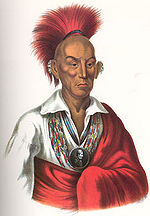 Black Hawk War Black Hawk War
- 7 Jun 1832—7 Jun 1832: Reform Bill passed ? Representation of the People Act
|
| 4 | 1833 | - Jan 1833—Jan 1833: Britain invades the Falkland Islands
- 29 Aug 1833—29 Aug 1833: Factory Act forbids employment of children below age of 9
|
| 5 | 1834 | - 1834—1834: Babbage invents forerunner of the computer
- 18 Mar 1834—18 Mar 1834: 'Tolpuddle Martyrs' transported (to Australia) for Trades Union activities
- 1 May 1834—1 May 1834: Slavery abolished in British possessions
|
| 6 | 1835 | - 1835—1835: Christmas becomes a national holiday
- 1835—1835: First railway boom period starts in Britain construction of Great Western Railway
- 2 Oct 1835—21 Apr 1836:
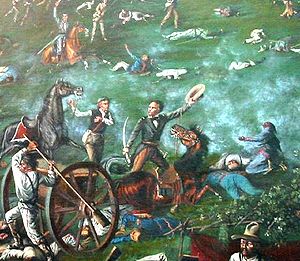 Texas War of Independence Texas War of Independence
|
| 7 | 1836 | - 1836—1836: First Potato famine in Ireland
- 30 Jan 1836—30 Jan 1836: Telford's Menai Straits Bridge opened ? considered the world's first modern suspension bridge
- 25 Feb 1836—25 Feb 1836: Samuel Colt patented the 'revolver'
- 6 Mar 1836—6 Mar 1836: The Alamo falls to Mexican troops - death of Davy Crockett
- Jul 1836—Jul 1836: Inauguration of the Arc de Triomphe in Paris
|
| 8 | 1837 | - 1837—1837: Pitman introduces his shorthand system
- 1837—1837: P&O Founded
- 1837:
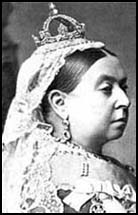 Victoria Becomes Queen Victoria Becomes Queen
- 4 Mar 1837—4 Mar 1841:
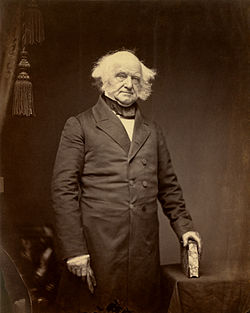 Martin Van Buren U.S. Presidency Martin Van Buren U.S. Presidency
- 20 Jun 1837—20 Jun 1837: William IV dies - accession of Queen Victoria (to 1901)
- 1 Jul 1837—1 Jul 1837: Compulsory registration of Births, Marriages & Deaths in England & Wales -
Registration Districts were formed covering several parishes; initially they had the same
boundaries as the Poor Law boundaries set up in 1834
- 13 Jul 1837—13 Jul 1837: Queen Victoria moves into the first Buckingham Palace
- 20 Jul 1837—20 Jul 1837: Euston Railway station opens - first in London
|
| 9 | 1838 | - 28 Jun 1838—28 Jun 1838: Coronation of Queen Victoria at Westminster Abbey
|
| 10 | 1839 | - 1839—1839: First Opium War between Britain and China (to 1842) - Britain captures Hong Kong
- 1839—1839: Scottish blacksmith Kirkpatrick MacMillan refines the primitive bicycle adding a
mechanical crank drive to the rear wheel,thus creating the first true 'bicycle' in the modern
Sense
- 1839—1839: Charles Goodyear invented vulcanized rubber
|
| 11 | 1840 | - 1840—1840: Population Act relating to taking of censuses in Britain
- 1840—1840: Last convicts landed in NSW (some say 1842 or 1849, but these probably landed
elsewhere)
- 10 Jan 1840—10 Jan 1840: Uniform Penny Postage introduced nationally
|
| 12 | 1841 | - 1841—1841: Thomas Cook starts package tours
- 10 Feb 1841—10 Feb 1841: Penny Red replaces Penny Black postage stamp
- 4 Mar 1841—4 Apr 1841:
 William Henry Harrison U.S. Presidency William Henry Harrison U.S. Presidency
- 4 Apr 1841—4 Mar 1845:
 John Tyler U.S. Presidency John Tyler U.S. Presidency
- 6 Jun 1841—6 Jun 1841: June 6: First full census in Britain in which all names were recorded (Population 18.5M)
|
| 13 | 1842 | - 1842—1842: Income Tax reintroduced in Britain
- 30 Mar 1842—30 Mar 1842: Ether used as an anesthetic for the first time (by Dr Crawford Long in America)
- 29 Aug 1842—29 Aug 1842: Treaty of Nanking - End of First Opium War - Britain gains Hong Kong
|
| 14 | 1843 | - 1843—1843: First Christmas card in England
- 27 May 1843—27 May 1843: The Great Hall of Euston station opened in London
- 19 Jul 1843—19 Jul 1843: Brunel's 'Great Britain' launched
|
| 15 | 1844 | - 6 Jun 1844—6 Jun 1844: YMCA founded in London by Sir George Williams
|
| 16 | 1845 | - 1845—1845: Tarmac laid for first time (in Nottingham)
- 4 Mar 1845—4 Mar 1849:
 James K. Polk U.S. Presidency James K. Polk U.S. Presidency
- 17 Mar 1845—17 Mar 1845: The rubber band patented by Stephen Perry
|
| 17 | 1846 | - 25 Apr 1846—2 Feb 1848:
 Mexican-American War Mexican-American War
- 10 Sep 1846—10 Sep 1846: The sewing machine is patented by Elias Howe
|
| 18 | 1847 | - 1847—1847: US Mormons make Salt Lake City their centre
- Jan 1847—Jan 1847: An anesthetic used for the first time in England (James Simpson used ether to numb the pain of labour)
|
| 19 | 1848 | - 1848—1848: First commercial production of chewing gum
- 24 Jan 1848—24 Jan 1848: Gold found at Sutter's Mill, California - starts the California gold rush
- 11 Jul 1848—11 Jul 1848: Waterloo railway station in London opens
|
| 20 | 1849 | - 1849—1849: Florin (2 shilling coin) introduced as the first step to decimalisation - which finally
occurred in 1971!
- 4 Mar 1849—9 Jul 1850:
 Zachary Taylor U.S. Presidency Zachary Taylor U.S. Presidency
|
| 21 | 1850 | |
| 22 | 1851 | - 1851—1851: Gold discovered in Australia
- 1 May 1851—1 May 1851: Great exhibition of the works of industry of all nations ('Crystal Palace' exhibition) opened in Hyde Park
|
| 23 | 1852 | - 1852—1852: Tasmania ceases to be a convict settlement
- 1852—1852: Wells Fargo established in USA
|
| 24 | 1853 | |
| 25 | 1854 | - 1854—1854: Cigarettes introduced into Britain
- 27 Mar 1854—27 Mar 1854: Britain declares war on Russia (Crimean War)
- 25 Oct 1854—25 Oct 1854: Battle of Balaklava in Crimea (charge of the Light Brigade)
|
| 26 | 1856 | - 1856—1856: End of Crimean War
- 29 Jan 1856—29 Jan 1856: Victoria Cross created by Royal Warrant, backdated to 1854 to recognise acts
during the Crimean War (first award ceremony 26 June 1857)
|
| 27 | 1857 | |
| 28 | 1858 | - 1858—1858: 'The great stink' - smell of the River Thames forced Parliament to stop work
- 1858—1858: Royal Opera House opens in Covent Garden, London
|
| 29 | 1859 | - 1859—1859: Peaceful picketing legalised in Britain
- 25 Apr 1859—25 Apr 1859: Work started on building the Suez canal (opened 17 Nov 1869)
- 4 May 1859—4 May 1859: Brunel's Royal Albert Bridge opened at Saltash giving rail link between Devon
and Cornwall
- 24 Nov 1859—24 Nov 1859: Charles Darwin publishes 'The Origin of Species'
|
| 30 | 1860 | - 29 Aug 1860—29 Aug 1860: First tram service in Europe starts in Birkenhead
|
| 31 | 1861 | |
| 32 | 1862 | - 1862—1862: Lincoln issues first legal US paper money (Greenbacks)
- 20 Apr 1862—20 Apr 1862: First pasteurisation test completed by Louis Pasteur and Claude Bernard
|
| 33 | 1863 | - 1863—1863: Football Association founded (UK)
- 1863—1863: Opening of state institution for criminally insane at Broadmoor, England
- 10 Jan 1863—10 Jan 1863: First section of the London Underground Railway opens
|
| 34 | 1864 | - 1864—1864: A man-powered submarine, 'Hunley' sank a Federal steam ship USS Housatonic at the entrance to Charleston harbour in 1864 - the first recorded successful attack by a submarine on a surface ship
- 11 Mar 1864—11 Mar 1864: The Great Sheffield Flood - over 250 died when a new dam broke while it was being filled for the first time
- 20 Aug 1864—20 Aug 1864: Red Cross established - Twelve nations sign the First Geneva Convention
- 8 Dec 1864—8 Dec 1864: Clifton Suspension Bridge over the River Avon officially opened
|
| 35 | 1865 | - 1865—1865: Elizabeth Garrett Anderson (1836-1917) becomes first woman doctor in England [she later became the first woman mayor in England, in Aldeburgh 1908]
- 1865—1865: First concrete roads built in Britain
- 14 Apr 1865—14 Apr 1865: End of American Civil War - slavery abolished in USA
- 14 Apr 1865—14 Apr 1865: Abraham Lincoln assassinated in Ford's Theatre by John Wilkes Booth
- 15 Apr 1865—4 Mar 1869:
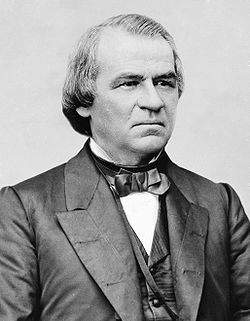 Andrew Johnson U.S. Presidency Andrew Johnson U.S. Presidency
- 5 Jul 1865—5 Jul 1865: William Booth (1829-1912) founds Salvation Army, in London
|
| 36 | 1867 | - 1 Jul 1867—1 Jul 1867: The British North America Act takes effect, creating the Canadian Confederation
|
| 37 | 1868 | - 1868—1868: Last convicts landed in Australia (Western Australia)
|
| 38 | 1869 | - 1869—1869: Ball bearings, celluloid, margarine, and washing machines, all invented
- 4 Mar 1869—4 Mar 1877:
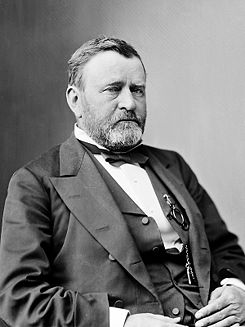 Ulysses S. Grant U.S. Presidency Ulysses S. Grant U.S. Presidency
- 23 Nov 1869—23 Nov 1869: Cutty Sark launched in Dumbarton
|
| 39 | 1870 | - 1870—1870: GPO takes over the privately-owned Telegraph Companies (nationalised)
- 1870—1870: Dr Thomas Barnardo opens his first home for destitute children
- 1870—1870: Water closets come into wide use
- 1870—1870: Diamonds discovered in Kimberley, South Africa
- 1 Oct 1870—1 Oct 1870: First British postcard - halfpenny post
|
| 40 | 1871 | - 27 Mar 1871—27 Mar 1871: First Rugby Football international, England v Scotland, played in Edinburgh
- 29 Mar 1871—29 Mar 1871: Opening of Royal Albert Hall, London
- 29 Jun 1871—29 Jun 1871: Trades Unions legalised in Britain, but picketing made illegal
|
| 41 | 1872 | - 1872—1872: Licensing hours introduced
- 1872—1872: Penalties introduced for failing to register births, marriages & deaths (Eng & Wales)
- 4 Dec 1872—4 Dec 1872: American ship 'Mary Celeste' is found abandoned by the British brig 'Dei Gratia' in the Atlantic Ocean
|
| 42 | 1874 | - 1874—1874: Factory Act introduces 56-hour week
- 5 Apr 1874—5 Apr 1874: Birkenhead Park opened, said to be the first civic public park in the world - features of it later copied in Central Park, New York
|
| 43 | 1875 | - 1875—1875: London's main sewage system completed
- 1 Jan 1875—1 Jan 1875: Midland Railway abolishes Second Class passenger facilities, leaving First Class and Third Class. Other British railway companies followed during the rest of the year. (Third Class was renamed Second Class in 1956)
|
| 44 | 1876 | - 14 Feb 1876—14 Feb 1876: Alexander Graham Bell and Elisha Gray each file a patent for the telephone - Bell awarded the rights
|
| 45 | 1877 | |
| 46 | 1878 | - 1878—1878: Edison & Swan invent electric lamp
- 1878—1878: Red Flag Act in Britain limits mechanical road vehicles to 4mph
- 1878—1878: CID established at New Scotland Yard
|
| 47 | 1879 | - 18 Sep 1879—18 Sep 1879: Blackpool illuminations switched on for first time
|
| 48 | 1880 | - 1880—1880: Education Act: schooling compulsory for 5-10 year olds
- 1880—1880: Mosquito found to be the carrier of malaria
- 2 Aug 1880—2 Aug 1880: Greenwich Mean Time adopted throughout UK
|
| 49 | 1881 | - 1881—1881: Postal Orders introduced
- 1881—1881: Flogging abolished in Army and Royal Navy
- 4 Mar 1881—19 Sep 1881:
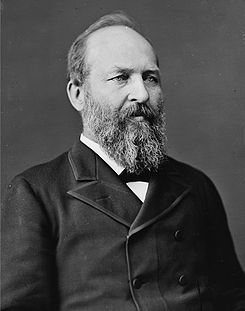 James A. Garfield U.S. Presidency James A. Garfield U.S. Presidency
- Sep 1881—Sep 1881: Godalming in Surrey became the first town in England to have a public electricity
supply installed (but in 1884 it reverted to gas lighting until 1904)
- 19 Sep 1881—4 Mar 1885:
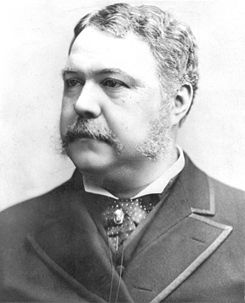 Chester A. Arthur U.S. Presidency Chester A. Arthur U.S. Presidency
- 26 Oct 1881—26 Oct 1881: Gunfight at OK Corral
|
| 50 | 1882 | - 1882—1882: Fourth Eddystone Lighthouse completed
|
| 51 | 1883 | - 1883—1883: Statue of Liberty presented to USA by France
- 24 May 1883—24 May 1883: Brooklyn Bridge, New York opens (crosses East River)
- 1 Aug 1883—1 Aug 1883: Parcel post starts in Britain
- 27 Aug 1883—27 Aug 1883: Eruption of Krakatoa near Java - 30,000 killed by tidal wave
|
| 52 | 1884 | - 31 May 1884—31 May 1884: John Harvey Kellogg patents corn flakes
- 13 Oct 1884—13 Oct 1884: Greenwich made prime meridian of the world
|
| 53 | 1885 | - 1885—1885: Carl Benz builds the 'Motorwagen', a single-cylinder motor car
- 1885—1885: Gottlieb Daimler patents the world's first motorcycle
- 1885—1885: Eastman makes first coated photographic paper
- 1885—1885: Canadian Pacific Railway completed
- Mar 1885—Mar 1885: First UK cremation in modern times took place at Woking
- 4 Mar 1885—4 Mar 1889:
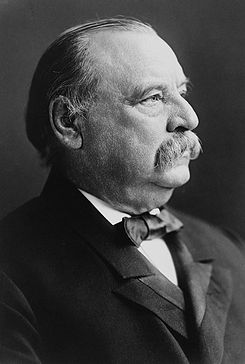 Grover Cleveland U.S. Presidency Grover Cleveland U.S. Presidency
- 5 Sep 1885—5 Sep 1885: The first train runs through the Severn Tunnel
- 29 Sep 1885—29 Sep 1885: First electric tramcar used at Blackpool
|
| 54 | 1886 | - 20 Jan 1886—20 Jan 1886: Mersey railway (under Mersey) opened by Prince of Wales
- May 1886—May 1886: Pharmacist John Styth Pemberton invents a carbonated beverage later named 'Coca-Cola'
- 29 May 1886—29 May 1886: Putney Bridge opens in London
|
| 55 | 1887 | - 1887—1887: Daimler produces a four-wheeled motor car
|
| 56 | 1888 | - 1888—1888: Convention of Constantinople guarantees free maritime passage through Suez Canal in war and peace
- 1888—1888: Jack the Ripper active in east London during the latter half of the year
- 1888—1888: County Councils set up in Britain
- 1888—1888: Dunlop invents pneumatic tyre
- 1888—1888: First box camera - George Eastman registers the trademark Kodak, and receives a patent
for his camera which uses roll film
- 20 Mar 1888—20 Mar 1888: Football League formed
|
| 57 | 1889 | - 1889—1889: Celluloid film produced
- 1889—1889: Dock Strike - docker's won their 'Docker's Tanner' 6 old pennies
- 4 Mar 1889—4 Mar 1893:
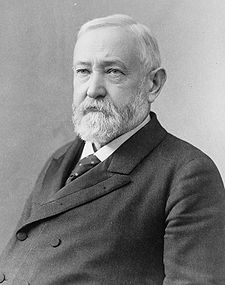 Benjamin Harrison U.S. Presidency Benjamin Harrison U.S. Presidency
- 31 Mar 1889—31 Mar 1889: Eiffel Tower completed (to mark centenary of French Revolution)
- 14 May 1889—14 May 1889: Children's charity NSPCC launched in London
- 3 Jun 1889—3 Jun 1889: Canadian Pacific Railway completed from coast to coast
- 28 Sep 1889—28 Sep 1889: Length of a metre defined
|
| 58 | 1890 | - 4 Mar 1890—4 Mar 1890: Forth railway bridge opens - took six years to build
- 4 Nov 1890—4 Nov 1890: City & South London Railway opens - London's first deep-level tube railway
and first major railway in the world to use electric traction
|
| 59 | 1891 | - 1891—1891: Primary education made free and compulsory
- 18 Mar 1891—18 Mar 1891: First telephone link between London & Paris
- 4 May 1891—4 May 1891: Fictional date when Sherlock Holmes throws Moriarty over Reichenbach Falls, then disappears for 3 years! (published in 1893)
- 24 Aug 1891—24 Aug 1891: Thomas Edison patents the motion picture camera
|
| 60 | 1892 | - 1892—1892: Electric oven invented
- 1892—1892: Shop Hours Act - limit 74 hours per week for under-18's
- 6 Oct 1892—6 Oct 1892: Alfred Lord Tennyson dies, aged 83, at his house Aldworth, near Haslemere
|
| 61 | 1893 | |
| 62 | 1894 | - 1894—1894: Picture postcard introduced in Britain
- 1 Jan 1894—1 Jan 1894: Manchester Ship Canal opens
- 1 Mar 1894—1 Mar 1894: Blackpool Tower opens
- 30 Jun 1894—30 Jun 1894: Tower Bridge first opens
- 2 Aug 1894—2 Aug 1894: Death duties first introduced in Britain
|
| 63 | 1895 | - 1895—1895: Sir Henry Wood starts Promenade Concerts in London
- 12 Jan 1895—12 Jan 1895: The National Trust founded in England
- 24 May 1895—24 May 1895: Henry Irving becomes the first person from the theatre to be knighted
- 28 May 1895—28 May 1895: Oscar Wilde sent to prison
- 12 Jul 1895—12 Jul 1895: First recorded motor journey of any length (56 miles) in Britain
- 17 Oct 1895—17 Oct 1895: First people in Britain to be charged with motor offences - John Henry Knight and James Pullinger of Farnham, Surrey
- Nov 1895—Nov 1895: X-rays discovered
|
| 64 | 1896 | - 5 Apr 1896—5 Apr 1896: First modern Olympic Games held in Athens
- 2 Jun 1896—2 Jun 1896: Guglielmo Marconi receives a British patent (later disputed) for the radio
|
| 65 | 1897 | |
| 66 | 1898 | - 1898—1898: First photograph using artificial light
- 1898—1898: Zeppelin builds airship
- 1898—1898: Goodyear Tire & Rubber Company founded
- 17 Mar 1898—17 Mar 1898: USS Holland launched, the first practical submarine
- 21 Apr 1898—13 Aug 1989:
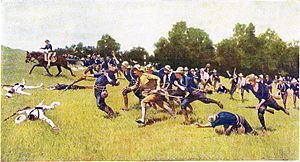 Spanish-American War Spanish-American War
- 27 Jun 1898—27 Jun 1898: The first solo circumnavigation of the globe completed at Rhode island by
Joshua Slocum in Spray (started from Boston, Mass on Apr 24, 1895)
|
| 67 | 1899 | - 4 Feb 1899—2 Jul 1902:
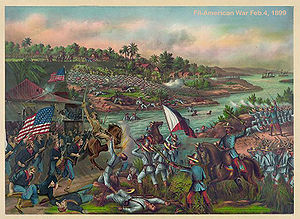 Philippine-American War Philippine-American War
- 6 Mar 1899—6 Mar 1899: Aspirin first marketed by Bayer
- 11 Oct 1899—11 Oct 1899: Start of Second Boer War
- 18 Oct 1899—7 Sep 1901:
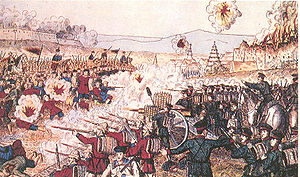 Boxer Rebellion Boxer Rebellion
|
| 68 | 1900 | - 1900—1900: School leaving age in Britain raised to 14 years
- 1900—1900: Central Line opens in London: underground is electrified
- 1900—1900: Escalator shown at Paris exhibition
- 9 Feb 1900—9 Feb 1900: Davis Cup tennis competition established
- 27 Feb 1900—27 Feb 1900: Labour Party formed
|
| 69 | 1901 | - 1901—1901: Commonwealth of Australia founded
- 1901—1901: Hubert Cecil Booth patents the vacuum cleaner
- 22 Jan 1901—22 Jan 1901: Queen Victoria dies - Edward VII king
- 2 Feb 1901—2 Feb 1901: Queen Victoria's funeral - interred beside Prince Albert in the Frogmore
Mausoleum at Windsor Great Park
- Jun 1901—Jun 1901: Denunciation of use of concentration camps by British in Boer War
- 14 Sep 1901—4 Mar 1909:
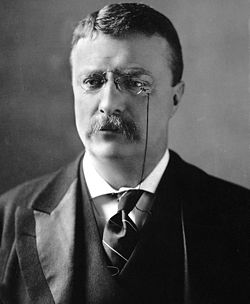 Theodore Roosevelt U.S. Presidency Theodore Roosevelt U.S. Presidency
- 2 Oct 1901—2 Oct 1901: Britain's first submarine launched
- 12 Dec 1901—12 Dec 1901: First successful radio transmission across the Atlantic, by Marconi - Morse
code from Cornwall to Newfoundland
|
| 70 | 1902 | - 1902—1902: Balfour's Education Act provides for secondary education
- 1902—1902: Cremation Act - cremation can only take place at officially recognised establishments,
and with two death certificates issued
- 1902—1902: Marie Curie discovers radioactivity
- 24 May 1902—24 May 1902: Empire Day (later Commonwealth Day) first celebrated
- 31 May 1902—31 May 1902: Treaty of Vereeniging ends Second Boer War
- 9 Aug 1902—9 Aug 1902: Coronation of Edward VII
|
| 71 | 1903 | - 1903—1903: Workers' Education Association (WEA) formed in Britain
- 1903—1903: Women's Social and Political Union formed in Britain by Emmeline Pankhurst
- 1903—1903: Henry Ford sets up his motor company
- 14 Dec 1903—14 Dec 1903: First flight of Wilbur & Orville Wright
- 17 Dec 1903:
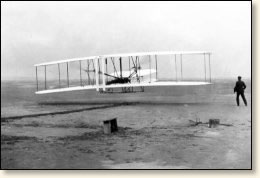 First Flight First Flight
|
| 72 | 1904 | - 1904—1904: Leeds University established
- 8 Apr 1904—8 Apr 1904: France and UK sign the Entente Cordiale
- 4 May 1904—4 May 1904: America takes over construction of the Panama Canal from the French
(completed 1914)
|
| 73 | 1905 | - 1905—1905: The title 'Prime Minister' noted in a royal warrant for the first time - placed the Prime
Minister in order of precedence in Britain immediately after the Archbishop of York
- 1905—1905: Aliens Act in Britain: Home Office controls immigration
- 1905—1905: Germany lays down the first Dreadnought battleship
- 11 Apr 1905—11 Apr 1905: Einstein publishes Special Theory of Relativity
|



 Submit Photo / Document
Submit Photo / Document
